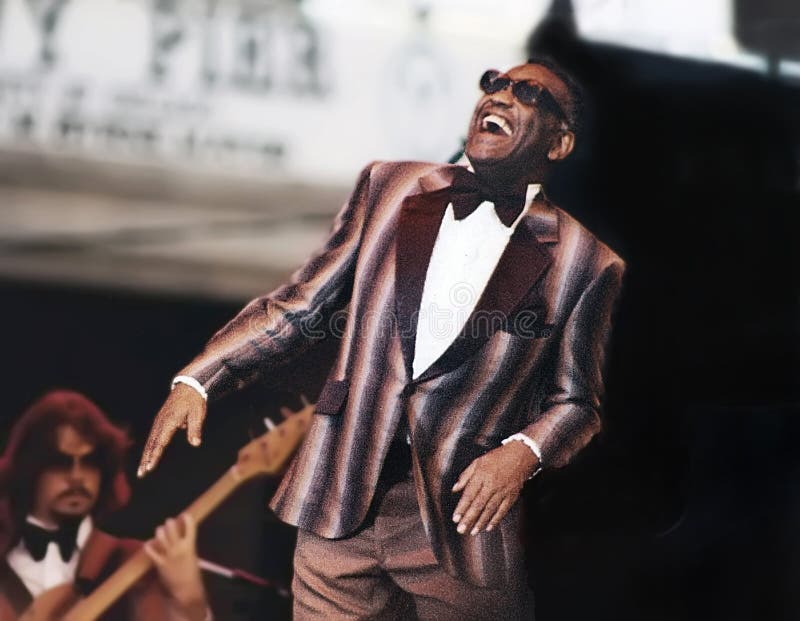Music lovers, gather 'round! If you’ve ever wondered who the man behind the soulful tunes, the smooth voice, and the timeless melodies is, let me introduce you to Ray Charles. This legendary musician didn’t just play music; he revolutionized it. Ray Charles wasn’t just a singer or a pianist—he was a force of nature, blending genres and breaking barriers in ways that no one had ever done before.
When we talk about Ray Charles, we’re not just discussing a musician. We’re diving into the life of a man who became synonymous with soul, rhythm, and blues. His influence transcends generations, and his impact on the music industry is undeniable. From "Georgia on My Mind" to "Hit the Road Jack," every note he touched turned to gold.
But this isn’t just about the hits. It’s about the man behind the music, the struggles he faced, and the triumphs he achieved. Ray Charles wasn’t just about making music—he was about creating an experience. His journey is one of resilience, passion, and pure genius. Let’s dive into the world of Ray Charles and uncover what made him such a legend.
Read also:Temporary Replacement Part 3 The Ultimate Guide You Need Right Now
Here's the roadmap for our journey:
- Biography: The Life and Times of Ray Charles
- Early Life: Where It All Began
- Musical Journey: From Struggles to Stardom
- Genre-Blending Genius: How Ray Charles Changed Music Forever
- Iconic Songs: The Hits That Defined an Era
- Legacy: The Impact of Ray Charles on Modern Music
- Challenges Faced: Overcoming Adversity
- Awards and Recognition: The Honors He Deserved
- Personal Life: Beyond the Spotlight
- Conclusion: Why Ray Charles Matters Today
Biography: The Life and Times of Ray Charles
Before we dive into the nitty-gritty of Ray Charles' career, let’s take a look at the man himself. Born on September 23, 1930, in Albany, Georgia, Ray Charles Robinson (he later dropped the last name to avoid confusion with boxer Sugar Ray Robinson) grew up in a world where music was more than just a hobby—it was a lifeline. From a young age, Ray showed an affinity for music, and by the time he was six, he was already playing the piano.
But life wasn’t all sunshine and roses for Ray. At the age of seven, he tragically lost his younger brother, and shortly after, he began losing his sight. By the time he was 12, Ray Charles was completely blind. Despite this, his passion for music only grew stronger. He attended the Florida School for the Deaf and the Blind, where he learned to read and write music in braille, setting the stage for the incredible career that lay ahead.
Here’s a quick glance at some key details about Ray Charles:
| Full Name | Ray Charles Robinson |
|---|---|
| Date of Birth | September 23, 1930 |
| Place of Birth | Albany, Georgia |
| Occupation | Singer, Pianist, Composer |
| Years Active | 1947–2004 |
| Genre | Soul, R&B, Blues, Jazz, Gospel |
Early Life: Where It All Began
Growing up in the segregated South wasn’t easy, especially for a young boy who was losing his sight. But Ray Charles wasn’t one to let adversity get the better of him. His mother, Aretha Robinson, instilled in him a sense of independence and resilience from a young age. She encouraged him to embrace his talents and never let his blindness define him.
By the time Ray was a teenager, he was already performing in local bands and honing his craft. His early influences ranged from gospel music to jazz, and he wasn’t afraid to experiment with different styles. This willingness to blend genres would later become one of his defining characteristics.
Read also:Mike Ross Height Unveiling The Truth Behind The Suits Legend
Musical Journey: From Struggles to Stardom
Ray Charles’ journey to stardom wasn’t without its challenges. In the late 1940s and early 1950s, he struggled to find his footing in the music industry. But his perseverance paid off when he signed with Atlantic Records in 1952. It was during this time that he began to develop his signature sound, blending gospel, blues, and R&B into something entirely new.
His breakthrough came in 1954 with the release of "I Got a Woman," a song that became a massive hit and established him as a force to be reckoned with. From there, there was no looking back. Ray Charles went on to release a string of hits, including "What’d I Say," "Hit the Road Jack," and "Georgia on My Mind," solidifying his place in music history.
Genre-Blending Genius: How Ray Charles Changed Music Forever
What set Ray Charles apart from his contemporaries was his ability to seamlessly blend different genres. He wasn’t content with sticking to one style; instead, he pushed the boundaries of what music could be. By incorporating elements of gospel, blues, jazz, and even country into his music, he created a sound that was uniquely his own.
This genre-blending approach wasn’t just innovative—it was revolutionary. It paved the way for future artists to experiment with different styles and break down the barriers between genres. Ray Charles didn’t just change the music industry—he helped shape it into what it is today.
Iconic Songs: The Hits That Defined an Era
When it comes to Ray Charles, it’s impossible not to talk about his iconic songs. From the soulful "Georgia on My Mind" to the upbeat "What’d I Say," his music has stood the test of time. Here are just a few of the hits that defined his career:
- Georgia on My Mind
- What’d I Say
- Hit the Road Jack
- I Can’t Stop Loving You
- Ain’t No Mountain High Enough
Each of these songs showcases Ray’s incredible talent and versatility as a musician. They’re not just songs—they’re experiences that continue to resonate with audiences around the world.
Legacy: The Impact of Ray Charles on Modern Music
The legacy of Ray Charles is felt in every corner of the music industry. His influence can be seen in the work of countless artists who have followed in his footsteps. From Stevie Wonder to Alicia Keys, musicians continue to draw inspiration from his groundbreaking approach to music.
But Ray’s impact goes beyond just music. He was a trailblazer in the fight for civil rights, using his platform to advocate for equality and justice. His contributions to both music and society have ensured that his legacy will live on for generations to come.
Challenges Faced: Overcoming Adversity
Throughout his career, Ray Charles faced numerous challenges, both personal and professional. From overcoming blindness at a young age to battling addiction in his later years, he never let obstacles stand in the way of his passion for music. His resilience and determination serve as an inspiration to all who hear his story.
One of the most significant challenges Ray faced was the racial discrimination he encountered throughout his career. Despite this, he refused to let it silence him. Instead, he used his music as a tool for change, breaking down barriers and paving the way for future generations.
Awards and Recognition: The Honors He Deserved
Ray Charles’ contributions to music have been recognized with numerous awards and honors. He was inducted into the Rock and Roll Hall of Fame in 1986 and received a Lifetime Achievement Award from the Grammys in 1987. In 2004, he was posthumously awarded the Presidential Medal of Freedom, the highest civilian honor in the United States.
These accolades are a testament to Ray’s incredible talent and the lasting impact he has had on the music industry. But more than that, they serve as a reminder of the power of music to bring people together and create change.
Personal Life: Beyond the Spotlight
While Ray Charles is best known for his music, his personal life was just as fascinating. He was married twice and had 12 children, many of whom have gone on to pursue careers in music themselves. Despite his busy schedule, Ray always made time for his family, and they remain a close-knit unit to this day.
In his later years, Ray focused on philanthropy, using his success to give back to the community. He established the Ray Charles Foundation, which provides scholarships and funding for music education programs across the country.
Conclusion: Why Ray Charles Matters Today
As we’ve seen, Ray Charles wasn’t just a musician—he was a trailblazer, a pioneer, and a legend. His contributions to music and society continue to inspire and influence people around the world. Whether you’re a fan of soul, R&B, or any other genre, there’s no denying the impact Ray Charles has had on the music industry.
So, what can we learn from Ray Charles? First and foremost, that passion and perseverance can overcome any obstacle. Ray didn’t let blindness, racism, or addiction stop him from pursuing his dreams. Instead, he used his experiences to fuel his creativity and create something truly remarkable.
So, the next time you hear one of Ray Charles’ iconic songs, take a moment to appreciate the man behind the music. And if you haven’t already, be sure to share this article with your friends and family. Let’s keep the legacy of Ray Charles alive for generations to come!


